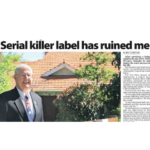Is the System Softer on the Rich and Famous?

There seems to be a public perception that those who are rich and famous are more likely than the average citizen to avoid the consequences of breaking the law.
But many prominent Australians have been imprisoned over the years – from wealthy entrepreneurs like Alan Bond and Rene Rivkin, to politicians like Pauline Hanson, actors like Robert Hughes and even judges like Marcus Einfeld.
So does money really buy immunity or freedom?
Justice bought?
We would all like to think that justice is blind, but the reality is that being able to afford a first class criminal defence has great advantages for those who are charged with serious crimes.
Given sufficient funding, private defence teams are able to closely scrutinise all aspects of the prosecution case, expose inconsistencies and deficiencies by using their knowledge of the law and legal requirements, engage a range of medical and forensic experts, issue broad subpoenae for production and attendance, explore all possible defences, spend substantial time pressuring the prosecution to drop charges and deliver a high quality all-round defence.
In serious cases, the prosecution will have access to enormous resources – often serving thousands of pages of statements and materials, and half a dozen expert statements. Without a high-quality defence, it is easy to see how many defendants end up ‘throwing in the towel’ and pleading guilty, or are found guilty in court, despite being innocent of the charges that are brought against them.
Sadly, organisations like Legal Aid and the Aboriginal Legal Service do not have sufficient resources or funding to provide clients with the highest quality legal defence. Indeed, those organisations often turn-away defendants that do not pass various eligibility criteria. This leaves such defendants stuck in the ‘justice gap’ without legal representation – being unable to afford a private lawyer but not qualifying for government assistance. And unlike the USA, defendants in Australia are not guaranteed legal representation in court.
Of course, getting a good criminal defence team is not a guarantee that you’ll get off scot-free. In cases where the prosecution evidence is very strong, the best outcome may be downgraded charges and a lenient penalty. But a thorough defence from a highly-experienced team will certainly give you the highest chance of achieving the optimal outcome.
The impact of fame and fortune
While money can certainly help to achieve the best outcome, fame and fortune isn’t always an advantage when it comes to the criminal justice system.
In fact, being famous or holding a position of public trust can lead to harsher treatment – as law enforcement agencies and courts will often place a heavier emphasis on ‘general deterrance’; in other words, deterring others from committing similar crimes. Additionally, a breach of trust may be treated as an ‘aggravating factor’ when it comes to sentencing, potentially leading to a heavier penalty.
Former Federal Court Judge and human rights advocate Marcus Einfield dedicated his life to public service and was one of the most highly respected members of the judiciary. The ‘Living National Treasure’ was caught doing 60km/h in a 50km/h zone and made the fateful decision to falsely state that he was not the driver at the time. He foolishly maintained that lie when under a duty to tell the truth and was ultimately sent to prison, despite his exemplary character and long service to the community.
Only eight per cent of other people who did the same thing were sent to prison, including those who had previous criminal convictions and did not contribute anywhere near as much to the community as Einfeld did. This is a prime example of a well-known person being treated far more harshly than others because of his position.
Prominent criminal lawyer Margaret Cunneen knows only too well the pitfalls and vulnerabilities of a person’s character. While she defeated ICAC in the High Court, Cunneen’s reputation was dragged through the mud and she was subjected to the stress of multiple court battles. The case against Cunneen concerned whether or not she had told her son’s girlfriend to fake chest pains in order to avoid a breath test – and by the way, the girlfriend, Sophia Tilley was later tested at the hospital and found to have no alcohol in her system.
This ‘overkill’ is not over yet – ICAC has now referred Cunneen’s case to the DPP for criminal prosecution. It is highly unlikely that any ordinary citizen would have been subjected to anywhere near the same level of scrutiny.
And even actors aren’t immune from sledgehammer wielding officials, as Hollywood superstar Johnny Depp recently discovered. He was shooting the latest instalment of the ‘Pirates of the Caribbean’ saga – bringing millions of investment dollars to Australia, creating jobs and giving great exposure to our country – when barnstorming politician Barnaby Joyce angrily took to the television screen threatening to have Depp’s dogs euthanised because they were not put through quarantine. There have even been suggestions of a criminal prosecution against Depp.
Chances are that no such threats would have been made to any ordinary traveller, let alone directly by a Federal Minister. One hopes that Joyce’s stunt won’t dissuade Depp or others from choosing Australia as a place to film or otherwise invest.
At the end of the day, fame and fortune certainly do not guarantee better treatment by players in the criminal justice system. In fact, quite the opposite appears to be true – with ‘tall poppies’ being pursued the most ferociously and sometimes losing the most.






